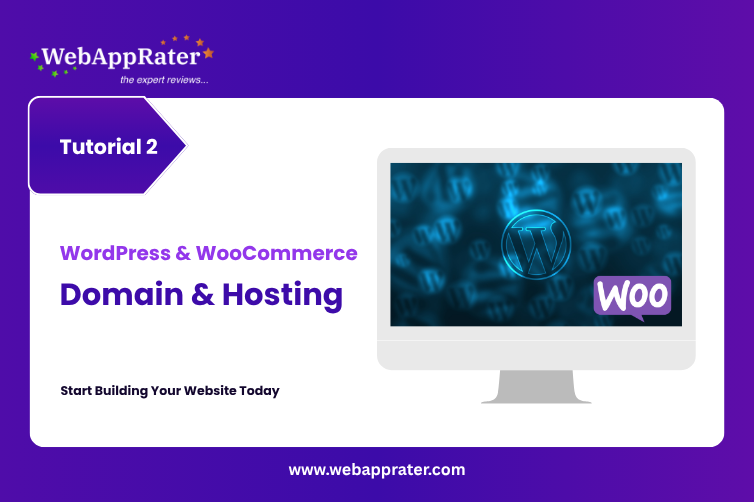Choosing the Right Hosting and Domain for WordPress Website
If you’re a professional — a lawyer, accountant, dentist, consultant, or small business owner — your website is the modern equivalent of your office front door. It’s often where potential clients get their first impression of you.
Before you design or install WordPress, two things form the foundation of your digital identity: your domain name and your hosting provider.
In this guide, we’ll walk you through how to choose the right domain and hosting for your WordPress site — the DIY way — so you can build a fast, reliable, and trustworthy online presence.
Before you dive into choosing your domain and hosting, it’s important to understand the foundation of WordPress itself.
👇 Read the Previous Tutorial: What Is WordPress and Why It Dominates Modern Web Design — discover how WordPress became the world’s most popular website platform and why it’s the ideal choice for professionals.
1. Understanding the Basics
Your domain name is your digital address (like drmeera.com or advocatesharma.in), while your web hosting is the space where your website files live.
Think of the domain as your clinic’s signboard, and hosting as the building that holds everything inside.
When someone types your domain into a browser, hosting servers deliver your WordPress website to their screen.
Choosing the right pair is crucial — a weak host or confusing domain can hurt your credibility before your site even loads.
2. Choosing the Perfect Domain Name
Your domain is part of your brand identity. For professionals, it should reflect trust, clarity, and memorability.
Tips for Selecting a Good Domain
- Keep it short and clear: Prefer meera-dental.com over dr-meera-maduro-clinic123.com.
- Use your profession or niche:
- Examples:
- sharmalegal.in for a lawyer
- precisionaccounts.com for an accountant
- satturexports.in for an exporter
- Stick to .com or local TLDs: For India-based professionals, .in or .co.in work well. For global reach, .comstill carries the highest trust factor.
- Avoid hyphens and numbers: These make domains harder to spell or remember.
- Register variants if available: If you’re drmeera.com, it’s smart to also register drmeera.in or drmeeraclinic.com to protect your brand.
💡 Pro Tip: Register your domain with a trusted registrar like Hostinger, GoDaddy, or Google Domains — and set up auto-renewal to prevent accidental expiry.
3. Selecting the Right Hosting Plan
Once you’ve got a domain, your next step is hosting — the engine that powers your website.
For WordPress, not all hosting is equal. The right plan can make your website faster, safer, and easier to manage.
Types of Hosting (Simplified for Professionals)
- Shared Hosting
- Your website shares a server with others.
- Ideal for personal portfolios or early-stage businesses.
- Example: Bluehost, Hostinger, SiteGround.
- Budget-friendly but limited in performance.
- Managed WordPress Hosting
- Optimized for WordPress with automatic updates, caching, and backups.
- Ideal for professionals who want performance without tech headaches.
- Example: Cloudways, WP Engine, Kinsta.
- Higher cost but premium support and reliability.
- VPS or Cloud Hosting
- Virtual Private Server or cloud-based (e.g., AWS, DigitalOcean).
- Suited for agencies, exporters, or clinics expecting high traffic or multiple sites.
- 🧠 Requires moderate tech knowledge or developer assistance.
4. Features You Should Look For in Hosting
When choosing hosting for your professional WordPress site, focus on:
- Speed & Uptime: At least 99.9% uptime and SSD-based servers.
- SSL Certificate: Essential for “https://” and client data security.
- Daily Backups: Protects against data loss or accidental changes.
- Automatic Updates: Keeps your WordPress secure.
- 24/7 Support: Look for chat or ticket-based support.
- Server Location: Choose a server closest to your main audience (India, Singapore, etc.).
- One-click WordPress Install: Saves time and simplifies setup.
💡 Pro Tip: Many managed WordPress hosts include free SSL, email accounts, and staging sites — these are worth paying slightly extra for.
5. Balancing Cost vs. Performance
If you’re starting a law firm or dental practice website, you don’t need enterprise-grade hosting right away.
However, choosing the cheapest plan can lead to a slow or unreliable site — which clients notice immediately.
A practical balance is:
- Shared Hosting: ₹150–₹400/month (good for solo professionals)
- Managed Hosting: ₹800–₹1500/month (best for growing practices)
- VPS or Cloud Hosting: ₹2000+/month (ideal for multi-page or eCommerce setups)
Remember: A fast, secure website gives a better first impression than any printed brochure.
6. Setup Flow: From Domain to WordPress
Here’s your simple DIY setup checklist:
- Buy your domain → from a trusted registrar.
- Purchase hosting → preferably one that supports WordPress installation.
- Connect domain to hosting → by updating DNS or nameservers.
- Install WordPress → most hosts offer a one-click setup.
- Log in to your dashboard → at yourdomain.com/wp-admin.
- Start building → pick your theme, design pages, and go live!
Once this foundation is in place, you’re ready to install themes, customize your site, and publish your services.
7. Bonus Tip: Branding Beyond the Domain
If you’re serious about creating a professional impression:
- Use a matching business email (e.g., [email protected]).
- Add a favicon and logo for visual identity.
- Set up Google Business Profile so clients find you easily.
- Enable SSL (https) and a simple contact form for trust.
Each of these steps signals credibility — whether you’re a solo consultant or a growing firm.
Conclusion
Your domain and hosting are the invisible foundations of your online presence — they determine your site’s speed, reliability, and first impression.
For professionals building their own WordPress website, investing time in choosing the right domain and hosting ensures that your site feels professional, loads fast, and earns client confidence.
Once your site is online, the next step is to design pages that convert visitors into leads — which we’ll cover in the next tutorial.





























0 Comments